St. Francis of Assisi Weekly Reflections

Receive The Holy Spirit
05-28-2023Weekly ReflectionWe Celebrate Worship Resource, Vol. 48, No. 2As we celebrate the coming of the Holy Spirit, we are treated to two separate origin stories. Both Luke (as the author of Acts) and John give us accounts of the moment in which the Holy Spirit came down upon the disciples. Funny thing is the stories are nearly completely different. According to Luke, the Spirit came on Pentecost itself, after Jesus had already ascended to be with the Father in heaven. But John tells us that Jesus personally gave the apostles the Holy Spirit when he first appeared to them after his resurrection, obviously before his ascension. Luke reports that the Holy Spirit came on a fierce wind, but John says it was on Jesus' gentle breath. In Acts, the disciples begin to proclaim God’s mighty acts loud enough to be heard by a crowd of people. In John, the disciples are silent, for they are in hiding. Perhaps we should think of the coming of the Holy Spirit as a process, or a series of episodes, rather than a single event. As the wind can buffet us as a strong gale or refresh us as a gentle breeze, the Holy Spirit, who first came to most of us when we were infants, comes to us again and again in different ways, with different gifts, and different workings, throughout our entire lives.
Do you feel the Holy Spirit’s movement in your life in both overwhelming and gentle ways? How have you been affected?
Recibe El Espíritu Santo
Mientras celebramos la venida del Espíritu Santo, se nos presentan dos historias de origen separadas. Tanto Lucas (como autor de los Hechos) como Juan, nos cuentan del momento en que el Espíritu Santo descendió sobre los discípulos. Lo curioso es que las historias son casi completamente diferentes. Según Lucas, el Espíritu vino el mismo día de Pentecostés, después de que Jesús ya había ascendido para estar con el Padre en el cielo. Pero Juan nos dice que Jesús personalmente les dio a los apóstoles el Espíritu Santo cuando se les apareció por primera vez después de su resurrección, obviamente antes de su ascensión. Lucas informa que el Espíritu Santo vino en un viento fuerte, pero Juan dice que fue en el suave aliento de Jesús. En Hechos, los discípulos comienzan a proclamar los hechos poderosos de Dios lo suficientemente alto como para ser escuchados por una multitud de personas. En Juan, los discípulos callan, porque están escondidos. Quizás deberíamos pensar en la venida del Espíritu Santo como un proceso, o una serie de episodios, en lugar de un solo evento. Así como el viento puede azotarnos como un fuerte vendaval o refrescarnos como una suava brisa, el Espíritu Santo, que vino a la mayoría de nosotros cuando éramos niños, viene a nosotros una y otra vez de diferentes maneras, con diferentes dones y diferentes funcionamiento, a lo largo de toda nuestra vida.
¿Sientes el movimiento del Espíritu Santo en tu vida tanto de manera abrumadora como gentil? ¿Cómo te ha afectado?

Our Mission: To Transform The World
05-21-2023Weekly ReflectionWe Celebrate Worship Resource, Vol. 48, No. 2On the day that Jesus died, the earth quaked, tombs were split open, and the veil of the sanctuary was torn in two. On the third day, Jesus’ tomb was opened and he was raised from the dead. Weeks later, having seen the Risen Lord, the apostles likely expected something cataclysmic. Their world had been transformed completely. When would the rest of the world realize it? Would lighting strike the religious and political leaders? Would the kingdom of Israel be restored? Why wasn’t the Risen Messiah doing something to transform the world? On this day, Jesus explains why. It is now up to the disciples. They are to bring the change they want to see. With the power of the Holy Spirit, they are to preach the gospel in all nations, teaching and making disciples, “baptizing them in the name of the Father, and of the Son, and of the Holy Spirit” (Matthew 28:19). There is no point in searching the skies, waiting for a sign or a reappearance. With the risen Christ remaining with them always, with the presence of the Holy Spirit, the power to transform the world was now in their hands. As it is now in ours.
How can you transform your world, bearing witness to the Risen Lord?
Nuestra Mision: Transformar El Mundo
El día que Jesús murió, la tierra tembló, los sepulcros se abrieron y el velo del santuario se rasgó en dos. Al tercer día, se abrió la tumba de Jesús y resucitó de entre los muertos. Semanas más tarde, habiendo visto al Señor Resucitado, los apóstoles probablemente esperaban algo catastrófico. Su mundo se había transformado por completo. ¿Cuándo se daría cuenta el resto del mundo? ¿Llegarían los rayos a los líderes religiosos y políticos? ¿Sería restaurado el reino de Israel? ¿Por qué el Mesías Resucitado no estaba haciendo algo para transformar el mundo? En este día, Jesús explica por qué. Ahora depende de los discípulos. Deben traer el cambio que quieren ver. Con el poder del Espíritu Santo, deben predicar el evangelio en todas las naciones, enseñando y haciendo discípulos, “bautizándolos en el nombre del Padre, y del Hijo, y del Espíritu Santo” (Mateo 28:19) . No tiene sentido buscar en los cielos, esperando una señal o una reaparición. Con Cristo resucitado permaneciendo siempre con ellos, con la presencia del Espíritu Santo, el poder de transformar el mundo estaba ahora en sus manos. Como lo es ahora en el nuestro.
¿Cómo puedes transformar tu mundo, dando testimonio del Señor Resucitado?

Spirit Lead Me
05-14-2023Weekly ReflectionWe Celebrate Worship Resource, Vol. 48, No. 2Today’s readings provide a sort of pre-Pentecost celebration of the coming of the Holy Spirit. Recall that it is only after the Holy Spirit descends upon the disciples that they are empowered to begin the Christian mission. Today we hear about Philip, then Peter and John traveling to Samaria to proclaim the gospel, attracting great crowds and bringing joy to the people. John, who had once suggested that an entire Samaritan village be destroyed for its inhospitality, now lays hands on the Samaritans, imparting the Holy Spirit to these people that the apostles had once seen as impure and unworthy. Peter goes on to remind the readers of his first letter that Jesus was resurrected in the Spirit and the Christians should respond to opponents with gentleness, willing to suffer for the sake of righteousness. In the Gospel, Jesus tells his disciples that the Father would send the Holy Spirit to remain with them and in them always. The Spirit is their Advocate, allowing them to proclaim the word, to testify to the truth, and to make intercession to God in Jesus’ name. Blessed with the Spirit, we now have the ability.
And that mission. How do you let the Spirit, our Advocate, speak through you?
Espíritu Guiame
Las lecturas de hoy brindan una especie de celebración previa a Pentecostés de la venida del Espíritu Santo. Recuerde que es solo después de que el Espíritu Santo desciende sobre los discípulos que reciben el poder para comenzar la misión cristiana. Hoy escuchamos acerca de Felipe, y luego a Pedro y Juan viajando a Samaria para proclamar el evangelio, atrayendo grandes multitudes y trayendo alegría a la gente. Juan, que una vez había sugerido que se destruyera toda una aldea samaritana por su falta de hospitalidad, ahora impone las manos sobre los samaritanos, impartiendo el Espíritu Santo a estas personas que los apóstoles habían visto una vez como impuras e indignas. Pedro continúa recordando a los lectores de su primera carta que Jesús resucitó en el Espíritu y que los cristianos deben responder a los opositores con mansedumbre, dispuestos a sufrir por causa de la justicia. En el Evangelio, Jesús les dice a sus discípulos que el Padre les enviará el Espíritu Santo para que permanezca con ellos y en ellos siempre. El Espíritu es su Abogado, permitiéndoles proclamar la palabra, testificar de la verdad e interceder ante Dios en el nombre de Jesús. Bendecidos con el Espíritu, ahora tenemos la capacidad. Y esa misión.
¿Cómo dejas que el Espíritu, nuestro Abogado, hable a través de ti?
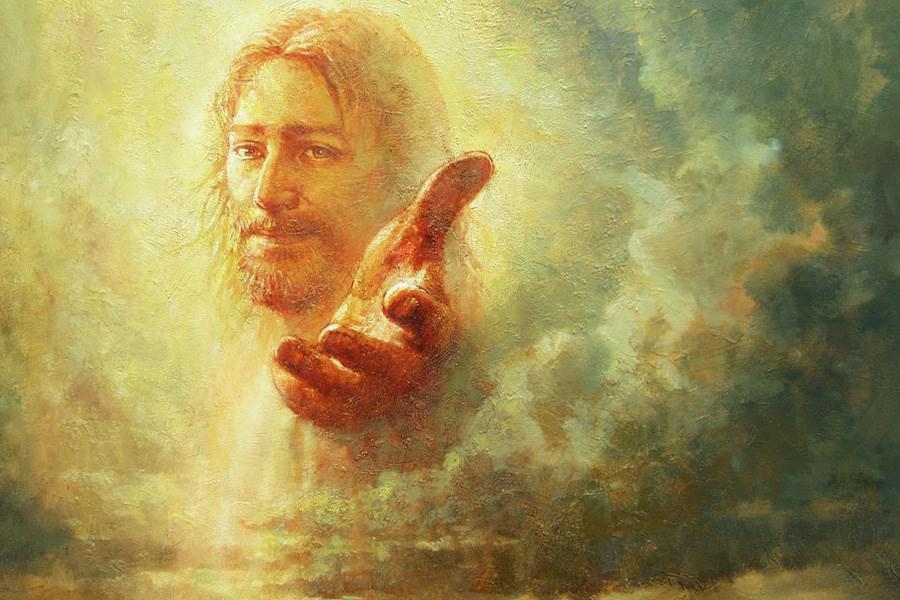
Way, Truth, And Life
05-07-2023Weekly ReflectionWe Celebrate Worship Resource, Vol. 48, No. 2For us, today’s Gospel promise that we have a home in Jesus is beautiful and comforting. For his first disciples, however, it is confusing. They misunderstand Jesus, just as they had when he told them that he would be killed and then raised from the dead. Thomas wants Jesus to draw a map to their destination and Phillip expects Jesus to bring the Father through the front door. Only Jesus understands where he is going. Even though he is the one who will be arrested, condemned, and crucified, Jesus tells his disciples, “Do not let your hearts be troubled” (John 14:1). He realizes that they will grieve his death. They will feel—at least for a while—that all is lost. Years later, when John writes his Gospel, he understands what Jesus was trying to tell them at the Last Supper. We know now what Jesus meant when he assured those who follow him that our faith in him enables us to do great things; that when we know him, we know the Father; and that by his death and resurrection, he has prepared a home for us. And so we can let our hearts be untroubled. We know we are in the Lord’s hands.
How are you consoled by Jesus’ words to his disciples?
Camino, Verdad, Y Vida
Para nosotros, la promesa del Evangelio de hoy de que tenemos un hogar en Jesús es hermosa y reconfortante. Para sus primeros discípulos, sin embargo, es confuso. Malinterpretan a Jesús, tal como lo hicieron cuando les dijo que lo matarían y luego resucitaría de entre los muertos. Tomás quiere que Jesús dibuje un mapa hacia su destino y Felipe espera que Jesús lleve al Padre por la puerta principal. Sólo Jesús entiende adónde va. Aunque él es quien será arrestado, condenado y crucificado, Jesús les dice a sus discípulos: “No pierdan la paz” (Juan 14:1). Se da cuenta de que llorarán su muerte. Sentirán, al menos por un tiempo, que todo está perdido. Años más tarde, cuando Juan escribe su Evangelio, entiende lo que Jesús estaba tratando de decirles en la Última Cena. Ahora sabemos lo que Jesús quiso decir cuando aseguró a quienes lo siguen que nuestra fe en él nos permite hacer grandes cosas; que cuando lo conocemos a él, conocemos al Padre; y que por su muerte y resurrección, nos ha preparado un hogar. Y así podemos dejar que nuestros corazones estén tranquilos. Sabemos que estamos en las manos del Señor.
¿Cómo te consuelan las palabras de Jesús a sus discípulos?
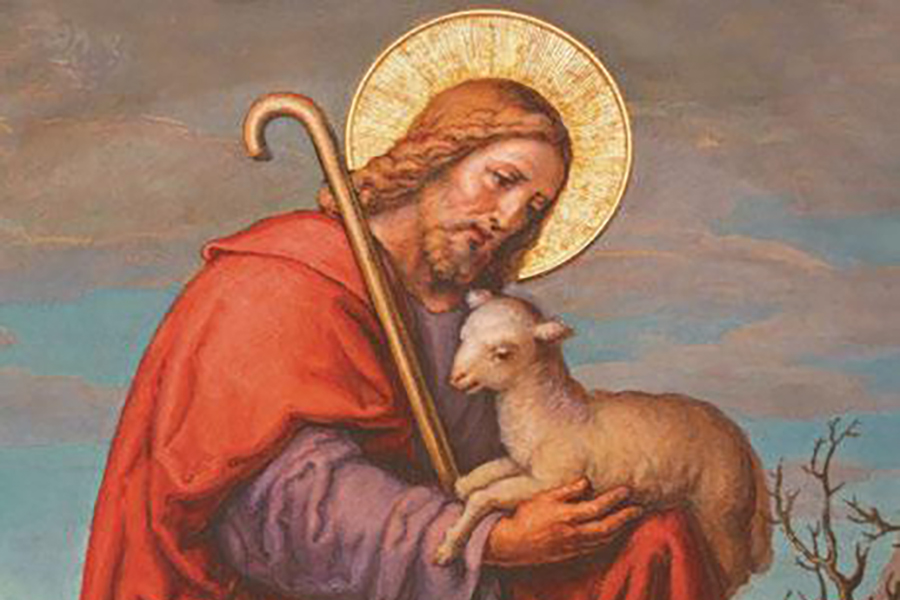
I Have Come That You May Have Life
04-30-2023Weekly ReflectionWe Celebrate Worship Resource, Vol. 48, No. 2Peter echoes the words of John the Baptist when he calls the people of Jerusalem to repentance and baptism, becoming a kind of messenger for the Risen Lord, as John was for the earthly Jesus. The forgiveness of both personal and original sin that follows repentance and baptism, in a way, the gate through which our Good Shepherd Jesus calls us. The Good Shepherd cares for his sheep, guarding them from harm, rescuing them when they are lost, guiding them back to the fold, feeding and nurturing them as long as they live. Of all people, Peter knows this, since he denied Jesus three times and abandoned him just hours before he was put to death. But after his Resurrection, Jesus not only forgives Peter, he commands him to “Feed my sheep,” trusting him to shepherd his people (John 21:17). In Jesus’ fold, where all are forgiven for the wrongs we have done, we “have life and have it more abundantly” (John 10:10).
What are you called to repent today? Will you seek the forgiveness that admits you into the Good Shepherd’s fold?
Yo He Venido Para Que Tengan Vida
Pedro se hace eco de las palabras de Juan Bautista cuando llama al pueblo de Jerusalén al arrepentimiento y al bautismo, convirtiéndose en una especie de mensajero del Resucitado, como lo fue Juan del Jesús terrenal. El perdón de los pecados personales y originales que sigue al arrepentimiento y al bautismo, en cierto modo, la puerta por la que nos llama nuestro Buen Pastor Jesús. El Buen Pastor cuida de sus ovejas, protegiéndolas de cualquier daño, rescatándolas cuando se pierden, guiándolas de vuelta al redil, alimentándolas y cuidándolas mientras vivan. De todas las personas, Pedro lo sabe, ya que negó a Jesús tres veces y lo abandonó solo unas horas antes de que lo ejecutaran. Pero después de su Resurrección, Jesús no solo perdona a Pedro, sino que le ordena “Apacienta mis ovejas”, confiando en él para pastorear a su pueblo (Juan 21:17). En el redil de Jesús, donde todos son perdonados por los errores que hemos hecho, “tenemos vida y la tenemos en abundancia” (Juan 10:10).
¿De qué estás llamado a arrepentirte hoy? ¿Buscarás el perdón que te admita en el redil del Buen Pastor?
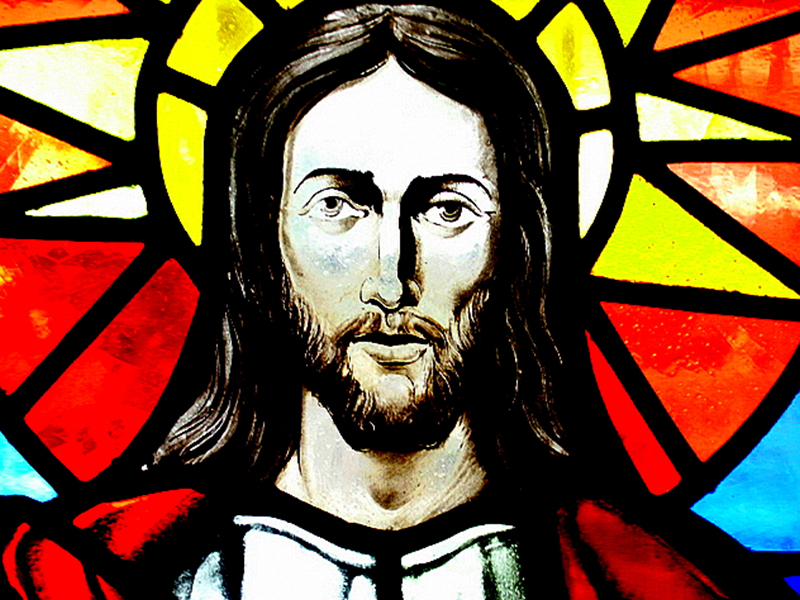
Encountering Jesus with Eyes of Faith
04-23-2023Weekly ReflectionWe Celebrate Worship Resource, Vol. 48, No. 2The pair of disciples from Emmaus were confused and disturbed. Jesus had been killed, dashing their hopes of Israel’s redemption. His tomb had been broken into and his body was missing. Angels had told some of the disciples that he was alive, but as far as these two knew, no one had seen him. So now they were leaving Jerusalem, discussing and debating what it all meant. Though downcast and uncertain, they welcomed the stranger as they made their way back home. Before long, the stranger was interpreting God’s word anew, leading them to think differently about the Messiah. Only later did they realize that he had reignited the passion in their hearts as he spoke. Not until they broke bread together were their eyes opened. They recognized the Risen Lord in that distinctive ritual. Each time we gather for Mass, we have the opportunity to encounter the Risen Lord in Word and Eucharist. May our eyes of faith see Jesus manifest to us as we encounter him in the word, in the breaking bread, and in all the unexpected places he meets us. May our hearts burn within us.
How can you recognize Jesus with eyes of faith?
Encontrando A Jesús Con Ojos De Fe
El par de discípulos de Emaús estaban confundidos y perturbados. Jesús había sido asesinado, acabando con sus esperanzas de la redención de Israel. Su tumba había sido forzada y su cuerpo había desaparecido. Los ángeles les habían dicho a algunos de los discípulos que estaba vivo, pero hasta donde estos dos sabían, nadie lo había visto. Así que ahora estaban saliendo de Jerusalén, discutiendo y debatiendo lo que significaba todo eso. Aunque abatidos e inseguros, dieron la bienvenida al extraño mientras regresaban a casa. En poco tiempo, el extraño estaba interpretando la palabra de Dios de nuevo, llevándolos a pensar de manera diferente sobre el Mesías. Solo más tarde se dieron cuenta de que había reavivado la pasión en sus corazones mientras hablaba. Hasta que partieron el pan juntos no se les abrieron los ojos. Reconocieron al Señor Resucitado en ese ritual distintivo. Cada vez que nos reunimos para Misa, tenemos la oportunidad de encontrarnos con el Señor Resucitado en la Palabra y la Eucaristía. Que nuestros ojos de fe vean a Jesús manifestándose a nosotros cuando lo encontramos en la palabra, en la fracción del pan, y en todos los lugares inesperados en los que se encuentra con nosotros. Que nuestros corazones ardan dentro de nosotros.
¿Cómo puedes reconocer a Jesús con los ojos de fe?
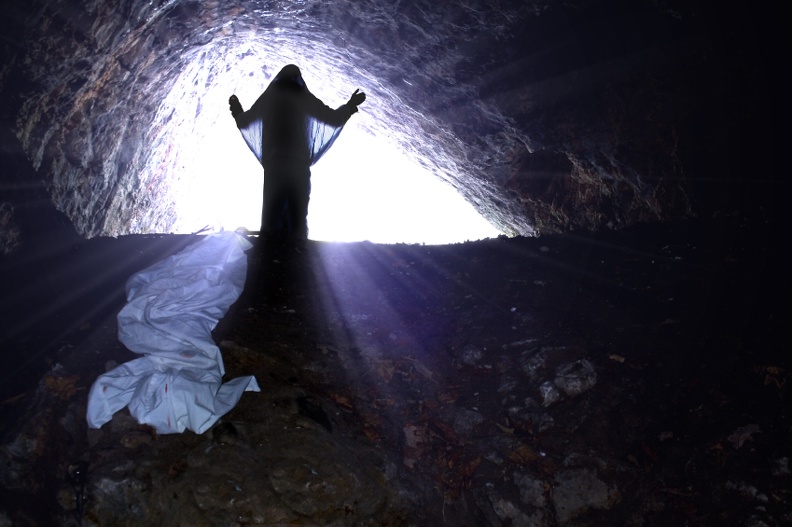
Let Us Rejoice In Him
04-16-2023Weekly ReflectionWe Celebrate Worship Resource, Vol. 48, No. 1Do you “rejoice with an indescribable and glorious joy” (1 Peter 1:8) as you attend Mass today? Unless something incredibly wonderful has just happened to you, probably not. But only a week ago we celebrated Easter, commemorating an event that is joyful and glorious beyond measure. Consider that even forty or fifty years after the Resurrection—when today’s readings were written—Peter wrote hat the Christian community still lived in the ineffable joy named above, despite the continual persecution suffered by the church at the time. Peter acknowledges this is in his letter, warning that they “may have to suffer through various trials” (1:6). We can relate. The ongoing hardships and tragedies in our lives and in the world may threaten to overwhelm the joy of the Resurrection. But our risen Lord continues to break into our lives, through locked doors and unbelieving resistance, assuring us of his victory over the powers of sin and death. Let us always rejoice in his saving presence and promise of eternal life as we, like the members of the early church, gather to break bread together.
What in your life makes it difficult to hold onto Easter joy?
How can your keep the Easter event central in your life?
Regocijémonos Siempre En Él
¿Te “gozas con un gozo indescriptible y glorioso” (1 Pedro 1:8) al asistir a Misa hoy? A menos que te haya pasado algo increíblemente maravilloso, probablemente no. Pero hace solo una semana celebramos la Pascua, conmemorando un evento que es gozoso y glorioso sin medida. Considere que incluso cuarenta o cincuenta años después de la Resurrección, cuando se escribieron las lecturas de hoy, Pedro escribió que la comunidad cristiana todavía vivía en el gozo inefable antes mencionado, a pesar de la continua persecución que sufría la iglesia en ese momento. Pedro reconoce esto en su carta, advirtiendo que “tal vez tengan que sufrir diversas pruebas” (1:6). Podemos relacionarnos. Las dificultades y tragedias en curso en nuestras vidas y en el mundo pueden amenazar con abrumar el gozo de la Resurrección. Pero nuestro Señor resucitado continúa irrumpiendo en nuestras vidas, a través de puertas cerradas y resistencia incrédula, asegurándonos su victoria sobre los poderes del pecado y la muerte. Regocijémonos siempre en su presencia salvadora y su promesa de vida eterna mientras nosotros, como los miembros de la iglesia primitiva, nos reunimos para partir el pan juntos.
¿Qué en tu vida te dificulta aferrarte a la alegría de la Pascua?
¿Cómo puedes mantener el evento de Pascua en el centro de tu vida?
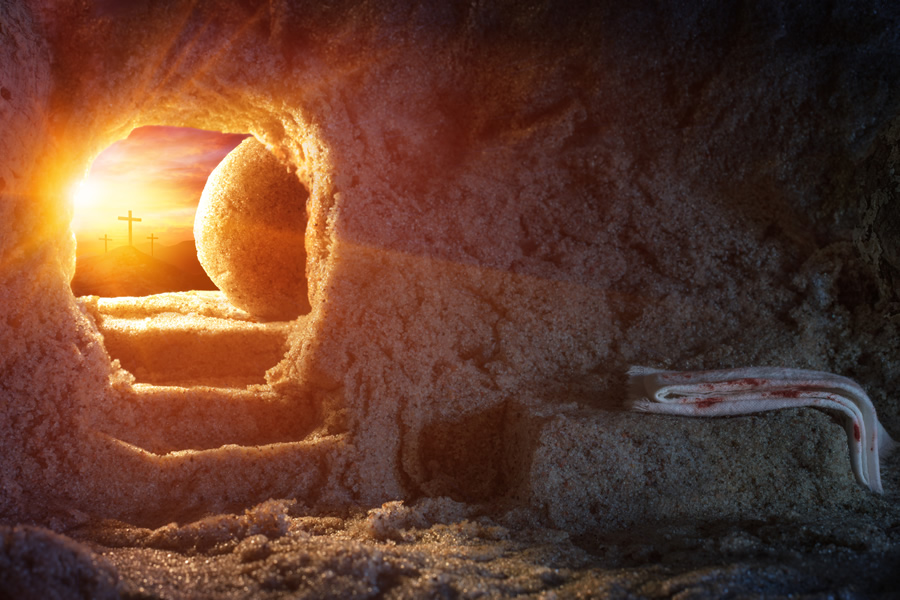
How has Christ’s Resurrection Transformed you?
04-09-2023Weekly ReflectionWe Celebrate Worship Resource, Vol. 48, No. 1On this glorious day, let us imagine what the first Easter morning was like for Jesus’ own disciples. According to John, Mary Magdalene comes to the tomb first, which is unsurprising since she is one of the few people who stayed with Jesus to the end. She is shaken and confused to see the open tomb. Simon Peter had abandoned Jesus before he was crucified, going so far as denying him, so he is eager to try to find Jesus’ body—anything to make up for his actions two days earlier. The disciple whom Jesus loved had been entrusted to care for the Blessed Mother, so he wants to safeguard her from upsetting news. We too each come to the Resurrection with our own concerns: our sorrows, our sins, our preoccupations. But everything we bring with us today is utterly transformed by the Resurrection. Our sorrows find meaning, our sins receive forgiveness, our preoccupations are banished to the shadows by our redemption. Just as the Resurrection transformed the lives of his disciples, so too does it transform our lives, today and every day. Alleluia!
How does the Resurrection transform your attitude, your perspective, and your day-to-day life?
¿Como Te Ha Transformado La Resurrection De Cristo?
En este glorioso día, imaginemos cómo fue la primera mañana de Pascua para los propios discípulos de Jesús. Según Juan, María Magdalena llega primero a la tumba, lo cual no nos sorprende ya que ella es una de las pocas personas que se quedó con Jesús hasta el final. Ella se estremeció y se confundió al ver la tumba abierta. Simón Pedro había abandonado a Jesús antes de que fuera crucificado, llegando incluso a negarlo, por lo que estaba ansioso por tratar de encontrar el cuerpo de Jesús, cualquier cosa para compensar sus acciones dos días antes. Al discípulo a quien Jesús amaba se le había encomendado el cuidado de la Santísima Madre, por lo que quería protegerla de noticias desagradables. También nosotros venimos a la Resurrección con nuestras propias preocupaciones: nuestros dolores, nuestros pecados, nuestras preocupaciones. Pero todo lo que traemos hoy con nosotros es completamente transformado por la Resurrección. Nuestros dolores encuentran sentido, nuestros pecados reciben perdón, nuestras preocupaciones son desterradas a las sombras por nuestra redención. Así como la Resurrección transformó la vida de sus discípulos, también transforma la nuestra, hoy y todos los días. ¡Aleluya!
¿Cómo transforma la Resurrección tu actitud, tu perspectiva y tu vida cotidiana?